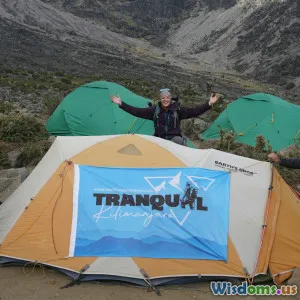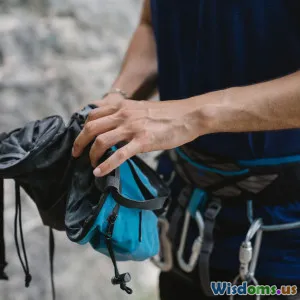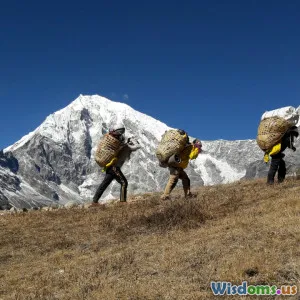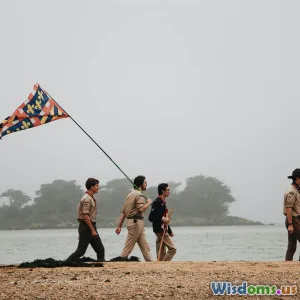
Underestimated Challenges Preparing Mentally for Remote Expeditions
16 min read Explore the overlooked mental hurdles of remote expeditions: isolation, anxiety, and self-doubt, and learn practical strategies to mentally prepare for challenging journeys. (0 Reviews)
Underestimated Challenges Preparing Mentally for Remote Expeditions
Every great journey begins with a map and a compass—or so we've been told. Yet, the true compass for remote expeditions is often concealed within: the mind. As the adrenaline rush of a departure fades, adventurers around the globe discover that the greatest challenges are not found in the landscape, but in themselves. This hidden terrain—mental preparedness for remote expeditions—is often underestimated, yet it repeatedly proves to be the pivotal factor between triumph and disaster, euphoria and defeat.
Today, more explorers than ever set out for the world's wildest corners, from the Patagonian ice fields to Saharan voids. The popularity of these trips and the related media coverage may foster a belief that resilience is merely a matter of physical fitness, technical planning, and willpower. But true preparedness runs much deeper. To understand why, let's pull back the curtain on the psychological labyrinth every expedition leader and rookie must navigate when confronted by the vast unknown.
Why Mental Preparation Often Goes Unnoticed
Obsession with Physical Preparation
When prepping for a river crossing in the Papua New Guinea highlands, most expeditioners focus on the calories in their packs, the waterproofing of gear, or navigation techniques. This is justified: a broken boot or poor map-reading invites disaster. But this focus risks eclipsing the true nature of adversity on such journeys. Anna McNuff, British endurance athlete and adventurer, recounted, “No one told me about the tears, or about the feeling of helplessness that would strike when everything went wrong. The hardest parts were in my mentally dark moments, not in my sore feet.”
The Allure of Control
Humans crave order, and expedition planning caters to this. Spreadsheets detailing day-to-day calories, routes, and contingency plans are comforting. Yet, few cultures or mental frameworks thrive when thrown into the unpredictable chaos unique to remote locations—some of which have no rescue option for days or weeks. The challenge arises not just in missing control, but in accepting its illusion. Remote treks force explorers to confront moments when plans unravel, revealing their state of mental flexibility and resilience.
Social Stigma and Underreported Struggles
Psychological struggles are sometimes whispered among mountaineers or polar adventurers, but rarely detailed on glossy magazine pages—partly because society often glamorizes stoicism and strength. The stigma around discussing fear, loneliness, or breakdowns persists, with even high-profile adventurers adroitly editing out their mental scars from social media. This absence of dialogue means many underestimate the internal battles they will inevitably face.
Core Mental Challenges Mislabeled as 'Minor' but Key to Survival
1. The Reality of Sustained Isolation
The Weight of Solitude
Unlike shorter trips or adventures with hospitable locals nearby, remote expeditions—such as solo Arctic crossings or Amazon rainforest navigation—entail days or weeks away from meaningful human contact. Research from NASA, the European Space Agency, and psychological case studies of Antarctic overwintering have repeatedly shown that such isolation can prompt a cocktail of anxiety, depression, and even perceptual distortions.
Real-World Insight: The Antarctic Diaries
Felicity Aston, the first person to ski solo across Antarctica, wrote, “Isolation was the defining landscape of my journey. My sense of time slipped, and I began to speak to myself out loud—at first for company, then because the silence was oppressive.”
Antidote: Training for Solitude
Experts suggest simulation of isolation periods during preparation—spending weekends offline in remote woods, meditation retreats without phone access, or even extended solitary walks—to normalize these effects. Cognitive behavioral techniques (CBT) can also give individuals the tools to recognize and de-escalate harmful thought spirals,� which might otherwise spiral during hardship.
2. Psychological Stress Under Physical Exhaustion
When the Body Fails, the Mind Must Prevail
Physical fatigue does not merely slow progress—it amplifies doubts, fear, and internal criticism. Studies in endurance athletes reveal that physical collapse is often preceded by a psychological barrier; a mental decision to stop that is framed as 'physical impossibility.'
Case Example: The Yukon Quest
The Yukon Quest, a 1,000-mile sled dog race through Alaska and Canada, sees mushers who are both seasoned and resourceful collapse—not from injury, but due to cumulative sleep- and nutrition-deprived mental fatigue. Many cite the mind's failure as the tipping point. “The dogs know the trail. But after eight days without proper sleep or warmth, your mind begins to rebel: you hallucinate, lose judgment, and struggle to motivate—even when conditions are safe,” said Emily, a two-time musher.
Antidote: Psychological Energy Management
Techniques such as positive self-talk, visualization, and mantras have proven surprisingly robust. Mental routines—so powerful they’re practiced by NASA astronauts and Navy SEALs—include rehearsing crisis scenarios, journaling adversity, and even memorizing calming imagery or phrases to anchor attention during rough spells.
3. Cognitive Overload: The Enemy of Decision Making
Multi-Tasking Becomes Multi-Strain
Remote expeditions demand constant vigilance: navigation, weather monitoring, logistics, dietary maintenance. Add in distress—weather suddenly clouding, an infected blister, a broken raft—and the brain's processing bandwidth collapses. Mountaineer and author Ed Viesturs explains, “Bad decisions are rarely spur-of-the-moment; they’re the result of being overwhelmed and losing perspective.”
Example: Hypoxia and Decision Fatigue
At high altitudes (for instance, above 5,000 meters in the Himalayas), oxygen deprivation impairs working memory—a physical limitation mirrored by decision fatigue in all remoteness: do you split up to fetch water, or conserve group energy? Both outcomes have visible and invisible risks. Psychological over-preparation—repeatedly planning 'if-then' scenarios ahead of time—relieves much of this in-the-moment brain strain.
4. Acute Loneliness and Self-Doubt
More Than Missing Home
Being alone on an Andean plateau or the Siberian steppes isn’t only about missing family or friends. The acute, gnawing sense of irrelevance or insignificance can morph into existential terror. Self-doubt blooms: “Why am I here? What’s the point?” Unlike motivational slumps in comfortable environments, these thoughts escalate when escape isn’t practicable.
Psychological Realities from the Field
A National Geographic survey of long-expedition leaders found the greatest predictors of failure were not logistical problems but psychological collapse stemming from loss of motivation and self-worth. Ted Fairhurst, who summitted “Seven Summits” past 70, shares: “The hardest voices to silence are my own. That nagging inner saboteur was worse than any storm.”
Antidote: Building Psychological 'Why' and Emotional First-Aid Kits
Expedition psychologist Dr. Eric Brymer recommends that explorers collect stories, motivations, and heartfelt reasons for their journey; when doubts hit, revisiting these reminders (through audio notes, letters, or symbolic tokens) provides emotional first aid. Pre-departure counseling or guided journaling sessions can help discover and record a strong, motivating 'why.'
Anticipating the Unpredictable: Psychological Strategies that Matter
Cultivating Adaptive Mindsets
An adaptive mindset is flexible and able to weather setbacks without rigid negativity. Regularly exposing oneself to unpredictable, controlled adversity through micro-adventures, adventure races, or scenario-based training helps recalibrate expectations. According to research in "Adventure Therapy and Psychological Resilience" (2019), repeated low-risk, high-learning experiences foster adaptability vital on remote trips.
Harnessing Social Connection from Afar
Even in severe isolation, modern communication tools—satellite phones, text devices, or pre-written letters from loved ones—buffer against acute loneliness. Polar explorer Ben Saunders leaves scheduled emails for himself in his inbox, written by family, to read on pre-planned 'dark days.' This technique anchors his sense of shared journey and social continuity, mitigating complete emotional isolation.
Meditation, Visualization, and Mindfulness
Both secular and spiritual forms of meditation, visualization, and mindfulness-based stress reduction (MBSR) lessen the mental impact of stress, fatigue, and emotional turbulence. NASA incorporates mindfulness into astronaut training, and top adventure athletes—such as climber Alex Honnold—credit daily practice as key to remaining composed under extreme situations. Simple breathing routines, body scans, or anchoring mantras prepare the mind to face adversity with curiosity rather than aversion.
Psychological Safety Protocols
Just as you pack an emergency kit, prepare protocols for mental emergencies: establish 'safe words' for team check-ins, actively schedule private emotional debriefs, and choose accountability partners both before and during the trip. Some seasoned expeditions incorporate daily “mental weather” check-ins: How is everyone, emotionally as well as physically? Elevating mental health to parity with physical health changes the decision-making framework, normalizes dialogue, and can prevent escalation from mood dip to mutiny.
Learning from Near Misses
Organizations such as the American Alpine Club maintain databases of psycho-social debriefs, detailing not just what went physically awry but also psychological warning signs, near-misses due to confidence loss, or insidious groupthink. Deliberate reflection on such incidents arms future adventurers better than any gear list can. Peer mentorship, sharing 'worst moments before breakthroughs,' proves to new explorers that cracks are natural, recoverable, and humanizing parts of the journey.
Lessons from Pioneers: First-Person Accounts and Evidence
Roald Amundsen: Anticipating the Unknown
The legendary Norwegian polar explorer meticulously planned for psychological hardships, scheduling daily routines, social rituals, and regular narrations for his team to stave off ennui and despair during over-wintering on the ice.
Steve Swenson: Mountaineering Self Knowledge
US mountaineer Steve Swenson, in "Karakoram: Climbing Through the Kashmir Conflict," reiterates: “My worth on the mountain has less to do with fitness, and more with knowing where my mind buckles, and how to stitch it back together.”
Modern Data: Expedition Success Factors
A comparative study of successful and failed expeditions, published in the "Journal of Adventure Education and Outdoor Learning," concludes psychological flexibility, proactive self-reflection, and conflict management skills trump any individual technical prowess over trips exceeding 8 days in isolation.
Practical Mental Preparation Toolkit
There’s no single panacea, but these strategies consistently aid mental fortitude during remote expeditions:
- Simulated Hardship Training: Spend deliberate time out of comfort; seek short solo overnights, strenuous bushwhacks, sleep deprivation tasks, or controlled navigation under pressure.
- Routine Journaling: Begin a daily practice well ahead of departure, cataloging emotions, reactions, setbacks, and wins—strengthening self-awareness and emotional vocabulary.
- Physical Preparation Inclusive of Stress Elements: Incorporate strenuous tasks that force emotional decision-making (e.g., rapid-fire navigation in thunderstorms, pack failure simulations) to mimic psychological pressure.
- Mental First Aid Model: Collaborate with an expedition psychologist, lay out warning signs for stress or withdrawal, and rehearse open communication within the squad or self-diagnostics.
- Emotional Anchoring: Gather a collection of meaningful letters, personal goals, or reminders—pre-crafted, ready to open on “bad days.”
- Emergency Social Toolbox: Pre-arrange times for check-in calls, scheduled messages, or morale-boosting content to be triggered when you're at your lowest ebb.
- Mindfulness Habit Integration: Even 5 minutes a day has measurable performance benefits; start months ahead so routines are automatic before departure stressors appear.
Conclusion: A New Kind of Expedition Mindset
While it may be the far horizon or the promise of untouched peaks that lure us away from civilization, it is the inner journey—fraught with doubt, ambiguity, and discomfort—that most determines our fate. To neglect this side of preparation is not just risky, but shortsighted. For modern expeditions, thorough mental preparation must be standard, as fundamental as packing a map or planning resupplies.
The next time you imagine a remote journey, ask yourself first: if the world shrinks to a tent, a diary, and yourself, what will matter most? With deliberate practice, openness to psychological preparation, and a commitment to self-honesty, you can make the journey within as rewarding—and survivable—as the adventure itself.
Rate the Post
User Reviews
Popular Posts




















